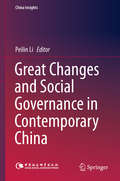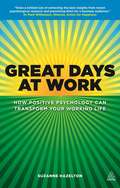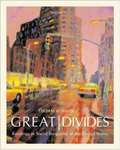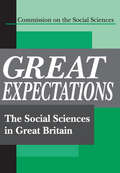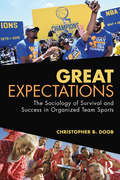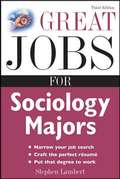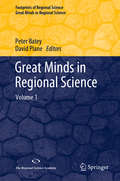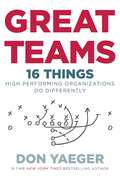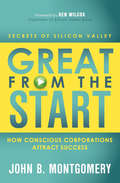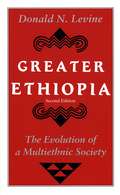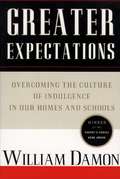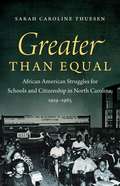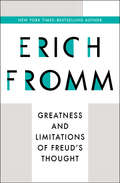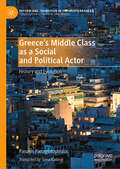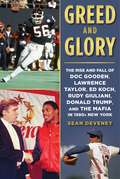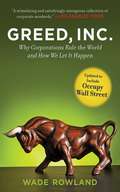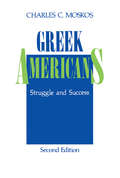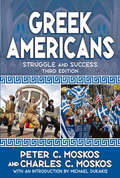- Table View
- List View
Great British Plans: Who made them and how they worked (Planning, History and Environment Series)
by Ian WrayCan the British plan? Sometimes it seems unlikely. Across the world we see grand designs and visionary projects: new airport terminals, nuclear power stations, high-speed railways, and glittering buildings. It all seems an unattainable goal on Britain’s small and crowded island; and yet perhaps this is too pessimistic. For the British have always planned, and much of what they have today is the result of past plans, successfully implemented. Ranging widely, from London’s squares and the new city of Milton Keynes, to ‘High Speed One’, the motorways, and the secret first electronic computers, Ian Wray’s remarkable book puts successful infrastructure plans under the microscope. Who made these plans and what made them stick? How does this reflect the defining characteristics of British government? And what does that say about the individuals who drew them up and saw them through? In so doing the book casts refreshing new light on how big decisions have actually been made, revealing the hidden sources of drive and initiative in British society, as seen through the lens of ‘plans past’. And it asks some searching questions about the mechanisms we might need for successful ‘plans future’, in Britain and elsewhere.Includes foreword by the Right Honourable the Lord Heseltine CH.
Great Changes and Social Governance in Contemporary China
by Peilin LiThis book offers a comprehensive review of the far-reaching social changes that have taken place since the start of the Chinese economic reform and opening up of Chinese society over 30 years ago. As such, it examines various aspects of the social transformation of China, from urbanization, population aging and social governance to family structure, youth society and social mentality. It identifies major issues and challenges emerging during the process of the great social change, and proposes solutions to aid in future strategic planning. The analysis is supported by a wealth of empirical data collected in the course of extended social survey research. The book also provides a systematic summary of the most important research findings from the past few years, helping readers to understand and interpret the ongoing and complex process of transformation in Chinese society.
Great Days at Work
by Suzanne HazeltonGreat Days at Work will enable you to become more enthusiastic at work, feel more positive and work more effectively with others. Drawing on the latest insights from positive psychology, it outlines practical day-to-day changes you can make immediately for instant benefit, as well as helping you develop a longer term version that means you'll get more out of work. The book is based on a three-layered framework, with the first layer focusing on the mindset for change, the second on personal responsibility, and the third on vision and choice. It reveals how to use these layers to develop an effective perspective on time, embed productive new habits, gain a clear sense of self and work better with others. As a result you will make a bigger contribution to your organization, as well as feeling more engaged, satisfied and in control of your own work and career. Discover how to have a great day at work, every day!
Great Divides: Readings in Social Inequality in the United States (3rd edition)
by Thomas M. ShapiroGREAT DIVIDES IS about the barriers that keep groups and individuals apart from one another in the United States.
Great Expectations: The Social Sciences in Great Britain
by Commission on the Social SciencesThe social sciences in the United Kingdom are extensive, diverse and influential. At any one time, more than four million students study the social sciences in schools; and about a half million students study social science in universities. Total university income from the social sciences is at the four billion dollar level. Beyond that, many social scientists hold key positions in government, business, the media, civil service, and the voluntary sector. Great Expectations reviews the status of the social sciences in Great Britain at the beginning of the twenty-first century. While making clear that work opportunities for social scientists are substantial and that levels of intellectual performance equal that of graduates in physics, it provides a hard hitting, empirically grounded examination of a near crisis situation. The report goes far beyond what one conventionally expects in commissioned reports, arguing that the academic treadmill, driven by excessive accountability burdens, reduces the originality and quality of much academic research. The report emphasizes the ideological and parochial nature of much British social research. As a result, there is little applicability internationally, even less interdisciplinary work, and at times, an outright bias against the market economy as such. The Commission Report, is even handed, tough minded, and frank in discussing how it is that social science and new social and technical forces do not always mesh. The optimism exuded is measured, but genuine. Great Expectations offers policy recommendations and scientific goals that can be serviceable not only in the United Kingdom, but in all advanced societies in which social research is a central component of economic stability and development. It is a superb reference volume enriched by original analysis and pungent, clear-headed writing. Members of the commission include: Professor David Rhind, Vice Chancellor of the City University served as Chairman of the Commission. Members included Huw Beynon (Cardiff), Patricia Broadbent (Bristol), Vicki Bruce (Edinburgh), Barry Buzzan (LSE), Sue Duncan (Government Researcher), Stuart Etherington (National Council for Voluntary Organizations), Janet Lewis (Oxford), Denise Lievesley (UNESCO), Richard Portes (LBS), Marc Renaud (Research Council of Canada), Michael Tonry (Cambridge), and David Walker (The Guardian).
Great Expectations: The Sociology of Survival and Success in Organized Team Sports
by Christopher B. DoobIn Great Expectations: The Sociology of Survival and Success in Organized Team Sports, sociological analysis proves to be a powerful ally for grasping how the sports world unfolds for team players, providing a range of sociological ideas and concepts that extend throughout the book. The text boxes and class discussion sections help summarize key issues, linking important sociological concepts to the topics at hand. The eight chapters begin with an introduction and then detail athletes’ activities at different stages in their development.
Great Feminist Denial
by Monica Dux Zora SimicWhat the hell happened? In The Great Feminist Denial the authors talk with women—feminists and non-feminists, young and old, famous and not famous, child-free and with child—and use their responses as a starting point from which to refocus the key debates. Dux and Simic argue that, ultimately, feminism is still necessary for everyday life. Even the most cursory glimpse at the social and cultural landscape suggests an urgent need for a politics that identifies inequalities, differences and strengths specific to women as a sex. The Great Feminist Denial puts an ailing feminist past to rest, and proposes a way forward that offers young women of today a new way of calling themselves feminists.
Great Jobs for Sociology Majors (Third Edition)
by Stephen LambertGreat Jobs books help students and recent college graduates explore the possibilities in their majors and provides guidance on how to present a major as a workplace asset during an interview.
Great Minds in Regional Science: Volume 1 (Footprints of Regional Science)
by Peter Batey David PlaneThis is the first volume in a new series on 'Great Minds in Regional Science,' which seeks to present a contemporary view on the scientific relevance of the work done by great thinkers in regional science. It presents, among others, Walter Isard, Martin Beckmann and Gunnar Myrdal. Each contribution combines factual biographical information, a description of their major contributions, and a discussion of the broader context of the work, as well as an assessment of its current relevance, scientific recognition and policy impact. The book attempts to fill a gap in our knowledge, and to respond to the growing interest in the formation and development of the field of regional science and its key influential figures.
Great Mirrors Shattered: Homosexuality, Orientalism, and Japan (Ideologies of Desire)
by John TreatA startling memoir of a year in Japan during its national hysteria over AIDS In 1986, John Whittier Treat went to Tokyo on sabbatical to write a book about the literature of Hiroshima and Nagasaki. But once there, he found himself immersed in the emergence of a new kind of Holocaust, AIDS, and the sweeping denial, hysteria, and projection with which Japan--a place where "there are no homosexuals"--tried to insulate itself from the epidemic. Great Mirrors Shattered is a compelling memoir of a gay man thoroughly familiar with the Japanese homosexual underground, a man anxious for his own health and unsure of the relationship he has left behind in the United States. It is also a highly self-aware analysis of Orientalism, which the author defines as "the Western study of everywhere else," and an exploration of how sexual identity conditions knowledge across cultures. Jump-cutting between such texts as Thomas Mann's Death in Venice, Pierre Loti's Madame Chrysantheme, Saikaku's The Great Mirror of Male Love, the writings of Roland Barthes, newspaper headlines, and his own experiences during a previous stay in Japan, Treat creates an intricately textured account of the problems inherent in how we "know" another culture. The questions of self and other, difference and sameness, time past and time present, America and Japan, are explored here with rare intelligence and unabashedly personal disclosure. Great Mirrors Shattered gives us a brilliantly fractured reflection of a year in one man's life, and the first study of the sexual politics behind what the West has come to know not just about Japan, but any place Europeans and Americans have gone to escape the confining rules of their home cultures. JOHN WHITTIER TREAT is Professor of Asian Languages and Literatures at the University of Washington, Seattle, and the author of Contemporary Japan and Popular Culture and Writing Ground Zero Japanese Literature and the Atomic Bomb. He lives in Seattle.
Great Teams: 16 Things High Performing Organizations Do Differently
by Don YaegerWhat makes a team great? Not just good and not just functional—but great?Over six years, long-time Sports Illustrated editor Don Yaeger was invited by some of the greatest companies in the world to speak about the habits of high-performing individuals. From Microsoft and Starbucks to the New England Patriots and San Antonio Spurs, what do some organizations do seemingly better than most of their opponents?Don took the challenge. He began building into his travel schedule opportunities to interview our generation&’s greatest team builders from the sports and business worlds. During this process, he conducted more than 100 interviews with some of the most successful teams and organizations in the country. From those interviews, Don identified 16 habits that drive these high-performing teams.Building on the stories, examples, and first-hand accounts, each chapter in Great Teams comes with applicable examples on how to apply these characteristics in any organization. Great Teams includes:Life lessons from some of the most notable names in sports and business applied to team-making in any situation Interviews from well-known players from Peyton and Eli Manning to Kevin DurantSkills to allow culture to shape who you recruit, manage dysfunction, friction, and strong personalitiesAdvice on how to win in critical situations, embrace change, build a mentoring culture, and see value others missGreat Teams is the ultimate intersection of the sports and business worlds and a powerful companion for thought leaders, teams, managers, and organizations that seek to perform similarly. The insight shared in this book is sure to enhance any team in its pursuit of excellence.
Great from the Start: How Conscious Corporations Attract Success
by John B. MontgomeryThe founder of the technology incubator Startworks provides &“a useful all-in-one blueprint to cover all aspects of putting together a successful company&” (Young Upstarts). Are you wondering how to turn your great new business idea into a successful company? Here&’s the roadmap. In Great from the Start, John Montgomery combines three decades of experience as one of America&’s preeminent corporate lawyers with the wisdom of a wide range of startup industry veterans to offer the business secrets of Silicon Valley as an essential blueprint for any entrepreneur wishing to start a successful company. From raising venture capital to building a balanced team, from designing your culture to managing a board of directors, this book will help you experience the joy of building a successful company. Finally, if you are a leader who aspires to operate from the heart, believes in abundance and plays power with instead of power over, Great from the Start suggests how you can leverage neuroscience and the science of consciousness to inspire and lead your corporation so that it is optimized for the people that work there. &“I have always struggled to communicate the multiple other relevant priorities, and the other intangibles required for a great execution. I found many of these in a new book, Great from the Start, by John B. Montgomery, which does a great job of laying out specifics, but also starts with a good summary of the intangibles, summarized as the five rules of relevancy.&” —Martin Zwilling, Forbes &“A high impact book.&” —Raj Sisodia, coauthor, Firms of Endearment and Conscious Capitalism, and founder Conscious Capitalism Institute
Greater Ethiopia: The Evolution of Multiethnic Society
by Donald N. LevineGreater Ethiopia combines history, anthropology, and sociology to answer two major questions. Why did Ethiopia remain independent under the onslaught of European expansionism while other African political entities were colonized? And why must Ethiopia be considered a single cultural region despite its political, religious, and linguistic diversity? Donald Levine's interdisciplinary study makes a substantial contribution both to Ethiopian interpretive history and to sociological analysis. In his new preface, Levine examines Ethiopia since the overthrow of the monarchy in the 1970s. "Ethiopian scholarship is in Professor Levine's debt. . . . He has performed an important task with panache, urbanity, and learning. "—Edward Ullendorff, Times Literary Supplement "Upon rereading this book, it strikes the reader how broad in scope, how innovative in approach, and how stimulating in arguments this book was when it came out. . . . In the past twenty years it has inspired anthropological and historical research, stimulated theoretical debate about Ethiopia's cultural and historical development, and given the impetus to modern political thinking about the complexities and challenges of Ethiopia as a country. The text thus easily remains an absolute must for any Ethiopianist scholar to read and digest. "-J. Abbink, Journal of Modern African Studies
Greater Expectations: Nuturing Children's Natural Moral Growth
by William DamonGreater Expectations is the book that exposed the low standards that children are confronted with in our homes, our schools, and throughout our culture. It exploded many of the misconceptions about children and how to raise them, including the cult of self-esteem, "child-centered" learning, and other overly indulgent practices that have been watering down the education and guidance that we are providing our young people. It disclosed how the self-centered ethic is damaging our youth. Greater Expectations started America talking about these issues and about how young people need to be provided with challenges and a sense of purpose if we want them to survive and thrive in life.Provocative and challenging, Greater Expectations was a wake-up call, a must-read for anyone concerned about the growing youth crisis in America and what we can do about it.
Greater Portland: Urban Life and Landscape in the Pacific Northwest
by Carl AbbottSelected by Choice magazine as an Outstanding Academic Title for 2001<P><P> It has been called one of the nation's most livable regions, ranked among the best managed cities in America, hailed as a top spot to work, and favored as a great place to do business, enjoy the arts, pursue outdoor recreation, and make one's home. Indeed, years of cooperative urban planning between developers and those interested in ecology and habitability have transformed Portland from a provincial western city into an exemplary American metropolis. Its thriving downtown, its strong neighborhoods, and its pioneering efforts at local management have brought a steady procession of journalists, scholars, and civic leaders to investigate the "Portland style" that values dialogue and consensus, treats politics as a civic duty, and assumes that it is possible to work toward public good.Probing behind the press clippings, acclaimed urban historian Carl Abbott examines the character of contemporary Portland--its people, politics, and public life--and the region's history and geography in order to discover how Portland has achieved its reputation as one of the most progressive and livable cities in the United States and to determine whether typical pressures of urban growth are pushing Portland back toward the national norm.In Greater Portland, Abbott argues that the city cannot be understood without reference to its place. Its rivers, hills, and broader regional setting have shaped the economy and the cityscape. Portlanders are Oregonians, Northwesteners, Cascadians; they value their city as much for where it is as for what it is, and this powerful sense of place nurtures a distinctive civic culture. Tracing the ways in which Portlanders have talked and thought about their city, Abbott reveals the tensions between their diverse visions of the future and plans for development.Most citizens of Portland desire a balance between continuity and change, one that supports urban progress but actively monitors its effects on the region's expansive green space and on the community's culture. This strong civic participation in city planning and politics is what gives greater Portland its unique character, a positive setting for class integration, neighborhood revitalization, and civic values. The result, Abbott confirms, is a region whose unique initiatives remain a model of American urban planning.
Greater than Equal
by Sarah Caroline ThuesenDuring the half century preceding widespread school integration, black North Carolinians engaged in a dramatic struggle for equal educational opportunity as segregated schooling flourished. Drawing on archival records and oral histories, Sarah Thuesen gives voice to students, parents, teachers, school officials, and civic leaders to reconstruct this high-stakes drama. She explores how African Americans pressed for equality in curricula, higher education, teacher salaries, and school facilities; how white officials co-opted equalization as a means of forestalling integration; and, finally, how black activism for equality evolved into a fight for something "greater than equal--integrated schools that served as models of civic inclusion. These battles persisted into the Brown era, mobilized black communities, narrowed material disparities, fostered black school pride, and profoundly shaped the eventual movement for desegregation. Thuesen emphasizes that the remarkable achievements of this activism should not obscure the inherent limitations of a fight for equality in a segregated society. In fact, these unresolved struggles are emblematic of fault lines that developed across the South, and serve as an urgent reminder of the inextricable connections between educational equality, racial diversity, and the achievement of first-class citizenship.
Greater than Ever: New York_s Ultimate Comeback Story
by Daniel DoctoroffDeputy Mayor Daniel L. Doctoroff led New York's dramatic and unexpected economic resurgence after the September 11 terrorist attacks. With Mayor Michael Bloomberg, he developed a remarkably ambitious five-borough economic development plan to not only recover from the attacks but to completely transform New York's economy: New neighborhoods were created. Hundreds of thousands of jobs were generated. The largest municipal affordable housing plan in American history was completed. Ground Zero was rebuilt. And New York adopted a pathbreaking sustainability plan.None of this was straightforward. New York has some of the most entrenched financial and political interests anywhere, and it has a population that is quick to let its public officials know exactly what is on its mind. Doctoroff's plans for a New York Olympic Games and a stadium on the West Side crashed and burned, but phoenix-like he engineered the transformation of the city anyway.Greater than Ever is a bracing adventure--when can-do attitude dove headlong into New York's unique realpolitik of "fuggedaboutit"--during which the city was changed for the better.
Greatness and Limitations of Freud's Thought
by Erich FrommRenowned social psychologist Erich Fromm&’s classic study of Freud&’s most important—and controversial—ideasBestselling philosopher and psychoanalyst Erich Fromm contends that the principle behind Freud&’s work—the wellspring from which psychoanalysis flows—boils down to one well-known belief: &“And the truth shall set you free.&” The healing power of truth is what Freud used to cure depression and anxiety, cutting through repression and rationalizations, and it provided the foundation for modern psychology. Freud&’s work, however, was not without its flaws. Though he pioneered many of the practices still in use today, Freud&’s perspective was imperfect. In Greatness and Limitation of Freud&’s Thought, Fromm deepens the understanding of Freud by highlighting not just his remarkable insights, but also his flaws, on topics ranging from dreams to sexuality. This ebook features an illustrated biography of Erich Fromm including rare images and never-before-seen documents from the author&’s estate.
Greece's Middle Class as a Social and Political Actor: History and Evolution (Reform and Transition in the Mediterranean)
by Panayis PanagiotopoulosThis book provides a comprehensive account and conceptualisation of the history and development of the middle class in Greece. What is the history of the middle class in the West after World War II? How is it related to consumerism, individualism and emancipation? How did it reach this, now unanimously admitted, existential crisis? Which is the historical course of the middle class in Greece from the 1960s onwards? Through which experiences was the social contract of the middle class during the Metapolitefsi drawn up? How is it that the Greek family acts as the middle class&’ natural habitat and its condemnation at the same time? Is there still a middle class identity in Greece or is it scattered in rival micro-communities of people who can hardly co-exist today, in a space of social and emotional desolation? Will the pandemic crisis validate the inequalities that govern the relationships among the members of the old middle class in Greece or will it prove to be a chance for a new social and cultural convergence?
Greece’s (un) Competitive Capitalism and the Economic Crisis: How the Memoranda Changed Society, Politics and the Economy
by Spyros SakellaropoulosThis book reviews the profound transformation to the Greek political economy in recent years and considers the reasons that have led to this transformation. Further, the author explores the social experimentation and social diversity that evolved as a result of the Greek and international economic crises. By challenging various assumptions made about the crisis, the author sheds light on Greek social relations and the country’s particular type of capitalist development.This book will be of value to both economists and sociologists, linking discussions about social class with economic, political and institutional analyses.
Greed and Glory: The Rise and Fall of Doc Gooden, Lawrence Taylor, Ed Koch, Rudy Giuliani, Donald Trump, and the Mafia in 1980s New York
by Sean DeveneyOn October 28, 1986, just one day after winning one of the most thrilling World Series in history, the New York Mets were feted by more than two million fans with a parade through the city. In news accounts of the event, there was a small aside, as this one in the New York Times: "Notable in his absence was the pitcher Dwight Gooden, who Mets officials later said had overslept." No, the Mets' twenty-one-year-old phenom had not slept too late. He had not slept at all, in fact. For Gooden, his postgame champagne celebration kicked off a cocaine binge that took him to a club in Long Island and wound up with him, wired, watching his teammates roll through the streets as he sat with strangers in a public housing project. Such were the 1980s in New York City, a gilded era buttressed by fast money from a real estate boom and the explosion of Wall Street wealth. The Mets and Giants, bolstered by lightning-rod personalities like Gooden and Lawrence Taylor, brought the city sporting glory while its celebrity wealthy added a tabloid-friendly touch of intrigue and national envy. Iconoclastic real estate developer Donald Trump gained national celebrity for his deal-making skill and the flaunting of his outsize ego. Even mayor Ed Koch had gained coast-to-coast fame and mention as a potential future president.Beneath the opulence was a tenuous foundation, one that collapsed spectacularly over the last half of the decade. Away from the cameras focused on the city's nouvelle riches, New York was beset by crisis after crisis--homelessness, AIDS, crack cocaine, organized crime. The swell of outrage over the unwillingness of the city elite to address those problems took years to finally reach a tipping point. Through interviews and detailed research, Greed and Glory gives the narrative of New York during these times, tracing the arc of its sports heroes and celebrities of that era, from their memorable highs to their ultimate lows.
Greed to Green: Solving Climate Change and Remaking the Economy
by Charles DerberThis book shows how we can solve the climate change crisis, which is the greatest threat humanity has faced. Charles Derber, a prominent sociologist and political economist, shows that global warming is a symptom of deep pathologies in global capitalism. In conversational and passionate writing, Derber shows that climate change is capitalism's time bomb, certain to explode unless we rapidly transform our economy and create a new green American Dream Derber shows there is hope in the financial meltdown and Great Recession we are now suffering. The economic crisis has raised deep questions about Wall Street and the US capitalist model. Derber systematically explores the causal links between capitalism and climate change, a taboo subject in the U.S, and opens up new thinking to solve both the economic and climate crises.
Greed, Inc.: Why Corporations Rule the World and How We Let It Happen
by Wade RowlandWhy is it that multinational drug companies hide or falsify unfavorable results? Why do automakers knowingly sell us unsafe cars? Why is big business allowed to poison our environment-and us? Why is our food so unhealthy, with obesity growing at such an alarming rate? Why are we working such long hours and enjoying life less? This timely and important book places the blame for much of what ails contemporary society squarely on one institution: the modern publicly traded corporation, which enjoys the legal status of an individual but does not seem bound by the same legal and moral responsibilities, or, in fact, by its nature that is brutally and implacably selfish.While recognizing the positive contributions corporations have made over the past two centuries to science, technology, and medicine, Rowland examines the greed at the core of it all and pinpoints what went wrong and how we can free ourselves from the "Greed is good" syndrome.
Greek Americans: Struggle and Success
by Charles C. MoskosThis is an engrossing account of Greek Americans--their history, strengths, conflicts, aspirations, and contributions. This is the story of immigrants, their children and grandchildren, most of whom maintain an attachment to Greek ethnic identity even as they have become one of this country's most successful ethnic groups.
Greek Americans: Struggle and Success
by Peter C. MoskosThis is an engrossing account of Greek Americans their history, strengths, conflicts, aspirations, and contributions. Blending sociological insight with historical detail, Peter C. and Charles C. Moskos trace the Greek-American experience from the wave of mass immigration in the early 1900s to today. This is the story of immigrants, most of whom worked hard to secure middle-class status. It is also the story of their children and grandchildren, many of whom maintain an attachment to Greek ethnic identity even as they have become one of America's most successful ethnic groups.As the authors rightly note, the true measure of Greek-Americans is the immigrants themselves who came to America without knowing the language and without education. They raised solid families in the new country and shouldered responsibilities for those in the old. They laid the basis for an enduring Greek-American community.Included in this completely revised edition is an introduction by Michael Dukakis and chapters relating to the early struggles of Greeks in America, the Greek Orthodox Church, success in America, and the survival and expansion of Greek identity despite intermarriage. This work will be of value to scholars of ethnic studies, those interested in Greek culture and communities, and sociologists and historians.

